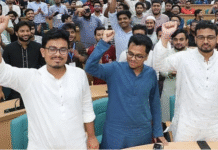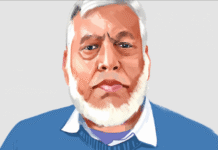We settle for less governance and more corruption to grab a bigger piece of the pie
The question came from a bank executive friend of mine. The gentleman studied at Dhaka University, worked at home and abroad at a few banks, and is now managing a large branch of a local commercial bank. He thought, if Mahathir Mohammad in Malaysia, or Hun Sen in Cambodia could rule for more than 20 years, why couldn’t Sheikh Hasina rule Bangladesh till 2021 and ensure its entry into the league of middle income countries and lead us towards a more prosperous and economically advanced Bangladesh?
He thought, as long as the economy was progressing, and people had more money to spend, they wouldn’t raise their voices. Besides, he thought, people should not forget that the Awami League’s founding father Bangabandhu Sheikh Mujib was the real force behind the creation of Bangladesh, hence only the AL should enjoy the rights to rule this country.
This sounded very interesting to me. As long as the country was moving forward, more people could get jobs abroad and send money home, farmers could get their inputs and the right prices for their produce, entrepreneurs could get more electricity, gas, financial support and incentives to build up and run enterprises, women would be given their due share, more government officials would get senior positions, people in the rural areas would sleep well.
Economic growth during the recent past AL regime was quite good. Power generation, inward remittance, foreign exchange reserves, exports, social safety net for the marginalised people, distribution of books to students, timely supply of agriculture inputs, modernisation of armed forces, elevation of civil bureaucrats, licenses for new banks and insurance companies, approvals for private universities, hospitals, fishing trawlers, and airlines, due honour for freedom fighters, all happened during this time.
We could see more women in decision-making roles, and the government taking a few noteworthy steps for children. My friend was right: “Why spend almost the equivalent of $100m for an unnecessary election?”
Like many, he said we should spend this money for building up more rural education and health infrastructure. I was almost scratching my head. Yes, there are issues with corruption, governance, a failing judiciary, and political killings, but my young friend argued that these were regular scenes in Sri Lanka, Indonesia, Brazil, and Mexico, but nobody bothered. In countries like Sri Lanka and Cambodia, they almost don’t have any opposition, he added.
Yes, government and leaders in the ruling party are seen involved in corruption, small and large. At the same time, we have a very vocal and independent media. They can highlight these, and the government would be forced to take action.
There are so many television, radio, and newspapers. They could do a great job against minority repression and violence against women, and for ensuring civic rights. Elections mean violence, arson, illegal money going around, and killings. We should therefore avoid elections as far as possible.
We can’t allow the losers of 1971 to rule this independent country. The same goes for their friends. The opposition has not been able to come up with an acceptable formula to topple the government through peaceful movement.
Moreover, with corrupt politicians, large beneficiaries of misrule, and partisan law enforcing agencies, a government can never be ousted through peaceful movement. You can make the movement violent, but you will lose your international and local civil society friends.
Ruling party politicians smile, my friends shift their loyalty once again to the ruling party, and civil society members decide to give breathing space to the new government, barring all controversies about the election process.
We curb our expectations. The seniors in the opposition camp take a step back to reconcile with a hard reality – while they are fighting the AL, they are in fact fighting with an emerging global power, India, and its articulate media.
So, what do we do? We settle for less governance and more corruption to grab a bigger piece of the pie, and we apple-polish the politically appointed regulators to get our jobs done. We settle in order to make more money to send our children abroad, or to buy a new flat or get a government plot. We know for sure that if we have more money in our hands, we can even buy justice.
There are a few people talking about democracy, or peaceful democratic transitions, like Rehman Sobhan or Sir Fazle Hasan Abed. To hell with them. They will soon be made to accept reality, and the latest version of democracy.
Otherwise, they will become known as “nabya razakars” by ruling party loyalists and their journalist friends. It does not matter whether one is the author of the two nation theory, or the creator of the world’s largest non-government solution provider for the marginalised.
My friend turned out to be so logical. He is happy with a government staying in power for 15-20 years, as long as they deliver. So are many of my friends.
Source: Dhaka Tribune










